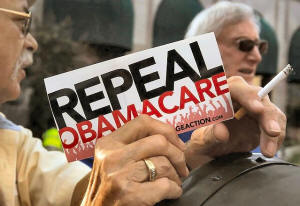|
Republican ideas for healthcare reforms
could spell trouble for U.S. states
 Send a link to a friend
Send a link to a friend
 [January 27, 2017]
By Robin Respaut and Hilary Russ [January 27, 2017]
By Robin Respaut and Hilary Russ
SAN FRANCISCO/NEW YORK (Reuters) -
President Donald Trump's push to fulfill a campaign promise to replace
Obamacare, his predecessor's signature healthcare plan, with the help of
a Republican-controlled Congress, could add to U.S. states' financial
strain.
That is because a key component of the 2010 law allowed states to expand
Medicaid, the government health insurance program for low-income
Americans, and collect extra dollars that came with expansion.
Thirty-one states and the District of Columbia chose to expand Medicaid
enrollment through Obamacare, formally known as the Affordable Care Act.
(Graphic -
http://fingfx.thomsonreuters.com/gfx/rngs/USA-OBAMACARE-MUNICIPALS/010031LN3PD/index.html)
While Republicans have not agreed to specific plans, one idea gaining
traction has been to convert the current system, in which states share
the cost of Medicaid enrollees with the federal government, into fixed
payments, or block grants, sent to the states.
Trump's nominee to run the U.S. Department of Health and Human Services,
U.S. Representative Tom Price, has long advocated such a plan.

The Kaiser Family Foundation estimates a repeal of Obamacare and a cap
on federal Medicaid spending, such as through a block grant or a per
capita cap, could cut Medicaid funding by 41 percent over the next
decade. That would likely handicap states' ability to respond to larger
enrollments during recessions.
"It will have clear implications for state budgets," said Robin
Rudowitz, the Washington-based associate director at Kaiser's Program on
Medicaid and the Uninsured. "States could raise revenue and spend less
in other areas, but these are not easy choices to make."
The foundation is a nonprofit focused on health issues.
Faced with inflexible federal funding, states might also decide to limit
Medicaid eligibility or freeze new enrollment, reducing the number of
people covered.
In a letter to congressional leaders on Tuesday, the National Governors
Association pleaded with lawmakers not to "shift costs to states."
New Jersey, one of many states struggling with ballooning public pension
costs and modest revenue growth, expanded Medicaid under Republican
Governor Chris Christie.
That state could lose up to $3 billion in federal aid if the Affordable
Care Act is repealed and have to spend $1 billion more from its budget,
Democratic state lawmakers there said this week.
MONEY FLOWS FROM THE HEART
Medicaid sits at the heart of the federal-state fiscal relationship.
Over $330 billion in federal Medicaid dollars flowed to states in fiscal
year 2016, accounting for more than half of all federal grants sent to
state and local governments and the largest individual program,
according to Standard & Poor's.
In 2015, the federal government paid about 60 percent of total Medicaid
costs while states paid 40 percent.
[to top of second column] |

A small group of demonstrators stand outside of of a hotel before
former South Carolina Senator Jim DeMint, president of the The
Heritage Foundation, speaks at a "Defund Obamacare Tour" rally in
Indianapolis, Indiana, U.S. August 26, 2013. REUTERS/Nate Chute/File
Photo

Medicaid enrollment also tends to spike during an economic downturn,
just as state revenues are most strained, spurring the federal
government to send more money to states.
Despite calls from Trump to Republican lawmakers on Thursday for
swift action on replacing Obamacare and on other priorities, changes
will likely still take time to work out.
House of Representatives Speaker Paul Ryan said the agenda would
take more than 100 days and said the goal "is to get these laws done
in 2017," without guaranteeing an Obamacare replacement would be
enacted by the end of December.
With so many details still up in the air, public officials are
hard-pressed to craft budgets that directly respond to their
concerns.
New York City Mayor Bill de Blasio on Tuesday said his next budget
would hold a record amount of money in reserve and seek at least $1
billion of savings citywide to compensate for "a huge amount of
uncertainty" emanating from Washington.
In California, Medicaid enrollment jumped from nearly 8 million in
2012 to more than 14 million today, thanks in part to federal
healthcare reforms.
In a letter earlier this month to U.S. House Majority Leader Kevin
McCarthy, Democratic California Governor Jerry Brown pleaded that
Congress consider reforms that do not burden state budgets.
"That would be a very cynical way to prop up the federal budget -
and devastating to millions of Americans," Brown wrote to the
Republican congressman from California.
However, Brown's proposed budget this month did not include a
contingency for a potential repeal of Obamacare or the threat of
changes to the federal tax code.

"Until there is a change in policy at the federal level, we will
continue to budget under the current rules of the road," said
California Finance Department spokesman H.D. Palmer.
(Reporting by Robin Respaut in San Francisco and Hilary Russ in New
York; editing by Daniel Bases and Jonathan Oatis)
[© 2017 Thomson Reuters. All rights
reserved.]
Copyright 2017 Reuters. All rights reserved. This material may not be published,
broadcast, rewritten or redistributed. |